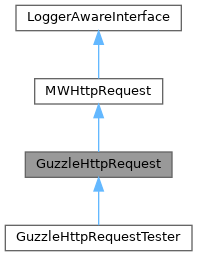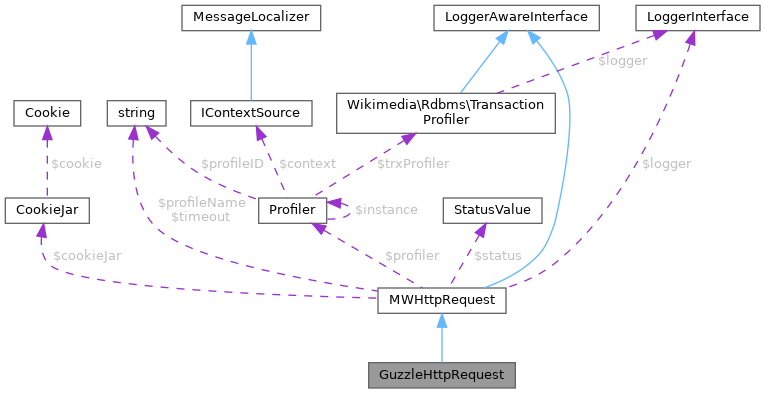MWHttpRequest implemented using the Guzzle library. More...


Public Member Functions | |
| __construct ( $url, array $options=[], $caller=__METHOD__, Profiler $profiler=null) | |
| execute () | |
| setCallback ( $callback) | |
| Set a read callback to accept data read from the HTTP request. | |
 Public Member Functions inherited from MWHttpRequest Public Member Functions inherited from MWHttpRequest | |
| canFollowRedirects () | |
| Returns true if the backend can follow redirects. | |
| getContent () | |
| Get the body, or content, of the response to the request. | |
| getCookieJar () | |
| Returns the cookie jar in use. | |
| getFinalUrl () | |
| Returns the final URL after all redirections. | |
| getResponseHeader ( $header) | |
| Returns the value of the given response header. | |
| getResponseHeaders () | |
| Returns an associative array of response headers after the request has been executed. | |
| getStatus () | |
| Get the integer value of the HTTP status code (e.g. | |
| isRedirect () | |
| Returns true if the last status code was a redirect. | |
| read ( $fh, $content) | |
| A generic callback to read the body of the response from a remote server. | |
| setCookie ( $name, $value, array $attr=[]) | |
| Sets a cookie. | |
| setCookieJar (CookieJar $jar) | |
| Tells the MWHttpRequest object to use this pre-loaded CookieJar. | |
| setData (array $args) | |
| Set the parameters of the request. | |
| setHeader ( $name, $value) | |
| Set an arbitrary header. | |
| setLogger (LoggerInterface $logger) | |
| setOriginalRequest ( $originalRequest) | |
| Set information about the original request. | |
| setUserAgent ( $UA) | |
| Set the user agent. | |
Public Attributes | |
| const | SUPPORTS_FILE_POSTS = true |
 Public Attributes inherited from MWHttpRequest Public Attributes inherited from MWHttpRequest | |
| const | SUPPORTS_FILE_POSTS = false |
Protected Member Functions | |
| doSetCallback ( $callback) | |
| Worker function for setting callbacks. | |
| parseHeader () | |
| Guzzle provides headers as an array. | |
| prepare () | |
| usingCurl () | |
 Protected Member Functions inherited from MWHttpRequest Protected Member Functions inherited from MWHttpRequest | |
| getHeaderList () | |
| Get an array of the headers. | |
| parseCookies () | |
| Parse the cookies in the response headers and store them in the cookie jar. | |
| proxySetup () | |
| Take care of setting up the proxy (do nothing if "noProxy" is set) | |
| setStatus () | |
| Sets HTTPRequest status member to a fatal value with the error message if the returned integer value of the status code was not successful (1-299) or a redirect (300-399). | |
Protected Attributes | |
| $guzzleOptions = [ 'http_errors' => false ] | |
| $handler = null | |
| $sink = null | |
 Protected Attributes inherited from MWHttpRequest Protected Attributes inherited from MWHttpRequest | |
| $caInfo = null | |
| callable | $callback |
| $connectTimeout | |
| $content | |
| CookieJar | $cookieJar |
| $followRedirects = false | |
| $headerList = [] | |
| $headersOnly = null | |
| LoggerInterface | $logger |
| $maxRedirects = 5 | |
| $method = "GET" | |
| $noProxy = false | |
| $parsedUrl | |
| $postData = null | |
| string | $profileName |
| Profiler | $profiler |
| $proxy = null | |
| $reqHeaders = [] | |
| $respHeaders = [] | |
| $respStatus = "200 Ok" | |
| $respVersion = "0.9" | |
| $sslVerifyCert = true | |
| $sslVerifyHost = true | |
| StatusValue | $status |
| int string | $timeout = 'default' |
| $url | |
Additional Inherited Members | |
 Static Public Member Functions inherited from MWHttpRequest Static Public Member Functions inherited from MWHttpRequest | |
| static | canMakeRequests () |
| Simple function to test if we can make any sort of requests at all, using cURL or fopen() | |
| static | factory ( $url, array $options=null, $caller=__METHOD__) |
| Generate a new request object Deprecated: | |
Detailed Description
MWHttpRequest implemented using the Guzzle library.
Differences from the CurlHttpRequest implementation: 1) a new 'sink' option is available as an alternative to callbacks. See: http://docs.guzzlephp.org/en/stable/request-options.html#sink) The 'callback' option remains available as well. If both 'sink' and 'callback' are specified, 'sink' is used. 2) callers may set a custom handler via the 'handler' option. If this is not set, Guzzle will use curl (if available) or PHP streams (otherwise) 3) setting either sslVerifyHost or sslVerifyCert will enable both. Guzzle does not allow them to be set separately.
- Since
- 1.33
Definition at line 39 of file GuzzleHttpRequest.php.
Constructor & Destructor Documentation
◆ __construct()
| GuzzleHttpRequest::__construct | ( | $url, | |
| array | $options = [], | ||
| $caller = __METHOD__, | |||
| Profiler | $profiler = null ) |
- Parameters
-
string $url Url to use. If protocol-relative, will be expanded to an http:// URL array $options (optional) extra params to pass (see Http::request()) string $caller The method making this request, for profiling Profiler | null $profiler An instance of the profiler for profiling, or null
- Exceptions
-
Exception
Reimplemented from MWHttpRequest.
Definition at line 53 of file GuzzleHttpRequest.php.
References $options, MWHttpRequest\$profiler, MWHttpRequest\$url, and(), and handler.
Member Function Documentation
◆ doSetCallback()
|
protected |
Worker function for setting callbacks.
Calls can originate both internally and externally via setCallback). Defaults to the internal read callback if $callback is null.
If a sink is already specified, this does nothing. This causes the 'sink' constructor option to override the 'callback' constructor option.
- Parameters
-
callable | null $callback
- Exceptions
-
InvalidArgumentException
Reimplemented from MWHttpRequest.
Definition at line 101 of file GuzzleHttpRequest.php.
References MWHttpRequest\$callback.
Referenced by prepare(), and setCallback().
◆ execute()
| GuzzleHttpRequest::execute | ( | ) |
- See also
- MWHttpRequest::execute
- Returns
- Status
Reimplemented from MWHttpRequest.
Definition at line 113 of file GuzzleHttpRequest.php.
References $e, $handler, MWHttpRequest\$postData, $request, $response, and(), handler, parseHeader(), prepare(), MWHttpRequest\setStatus(), and usingCurl().
◆ parseHeader()
|
protected |
Guzzle provides headers as an array.
Reprocess to match our expectations. Guzzle will have already parsed and removed the status line (in EasyHandle::createResponse).
Reimplemented from MWHttpRequest.
Definition at line 245 of file GuzzleHttpRequest.php.
References and(), and MWHttpRequest\parseCookies().
Referenced by execute().
◆ prepare()
|
protected |
Reimplemented from MWHttpRequest.
Definition at line 228 of file GuzzleHttpRequest.php.
References doSetCallback().
◆ setCallback()
| GuzzleHttpRequest::setCallback | ( | $callback | ) |
Set a read callback to accept data read from the HTTP request.
By default, data is appended to an internal buffer which can be retrieved through $req->getContent().
To handle data as it comes in – especially for large files that would not fit in memory – you can instead set your own callback, in the form function($resource, $buffer) where the first parameter is the low-level resource being read (implementation specific), and the second parameter is the data buffer.
You MUST return the number of bytes handled in the buffer; if fewer bytes are reported handled than were passed to you, the HTTP fetch will be aborted.
This function overrides any 'sink' or 'callback' constructor option.
- Parameters
-
callable | null $callback
- Exceptions
-
InvalidArgumentException
Reimplemented from MWHttpRequest.
Definition at line 86 of file GuzzleHttpRequest.php.
References MWHttpRequest\$callback, and doSetCallback().
◆ usingCurl()
|
protected |
- Returns
- bool
Definition at line 236 of file GuzzleHttpRequest.php.
References and(), and handler.
Referenced by execute().
Member Data Documentation
◆ $guzzleOptions
|
protected |
Definition at line 44 of file GuzzleHttpRequest.php.
◆ $handler
|
protected |
Definition at line 42 of file GuzzleHttpRequest.php.
◆ $sink
|
protected |
Definition at line 43 of file GuzzleHttpRequest.php.
◆ SUPPORTS_FILE_POSTS
| const GuzzleHttpRequest::SUPPORTS_FILE_POSTS = true |
Definition at line 40 of file GuzzleHttpRequest.php.
The documentation for this class was generated from the following file:
- includes/http/GuzzleHttpRequest.php